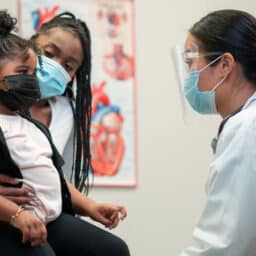Help Your Child Build Executive Function Skills
If your child has difficulty with starting or completing tasks, following directions, switching between activities or organizing their thoughts, they may struggle with executive function. Executive function refers to a set of skills that help us plan, make goals and finish activities. We’re launching two weekly groups to help children build these skills. Participants will…
Communication Tips in Honor of Better Hearing & Speech Month
May is Better Hearing & Speech Month, an annual occasion designed to raise awareness of hearing loss and speech problems. In keeping with that theme, the Speech & Hearing Associates speech-language pathology team is pleased to share some tips for helping children with communication difficulties thrive. Every parent should know that the most crucial action…
Amp Up Your Summer Fun—Take Advantage of Better Hearing & Speech Month Specials
With summer approaching, we want to make sure you’re able to gear up for all the giggles, gatherings and good times ahead. May is Better Hearing & Speech month, which means it’s a great time to check in and see how things are going with your hearing. Whether you currently wear hearing devices or generally…
Does My Child Need a Speech Evaluation?

If your child is exhibiting the symptoms of a speech disorder, you should schedule an appointment for a speech evaluation with a speech-language pathologist (SLP) right away. If diagnosed, they can then begin speech therapy. Speech therapy has been shown to be highly effective in improving speech skills. In fact, one study found, “An average…
What’s Happening in Your Body When You Lose Your Voice

Have you ever opened your mouth to speak, only for a whisper or a croak to come out? This symptom is known as hoarseness. Hoarseness describes vocal fatigue, vocal breaks or abnormal voice. We review what’s happening in your body when you’re hoarse, how long you should wait to seek care and how to care…
Ways to Keep Your Voice Healthy

Whether you’re on the job or talking to a friend on the phone, you use your voice a lot. In fact, you may not realize how much you use it until you lose it. Below we review tips for keeping your voice healthy and strong. Quit Smoking & Vaping One of the best things you…
How To Help Your Child With a Stutter

Stuttering is a common pediatric speech-language disorder. Research has shown that stuttering affects 5-10% of preschoolers. If you’re a parent of a child who stutters, know that there are various things you can do to help them. Be Patient and Supportive Try to create a relaxed environment for you and your child to talk. Set…
SpeechEasy: The Season of Giving is Here!
SpeechEasy Season of Giving Discount Offer-Limited Time! Beginning November 18, 2017 and ending January 31, 2018, SpeechEasy is offering a $1000 discount on our most popular model-just in time for this great season of the year.
National Institute on Deafness and Other Communication Disorders Explains:
Protein in inner ear is key to how cells that help with hearing and balance are positioned. Using animal models, scientists have demonstrated that a protein called Emx2 is critical to how specialized cells that are important for maintaining hearing and balance are positioned in the inner ear. Emx2 is a transcription factor, a type…
Signs of a Speech-Language Disorder in Children and Adults
Suspect a Speech or Language Disorder? Here’s What You Need to Know: Signs of a Speech-Language Disorder in Children: • Does not smile or interact with others (birth and older) • Does not babble (4-7 months) • Makes only a few sounds or gestures, like pointing (7-12 months) • Does not understand what others say (7 months-2 years)…